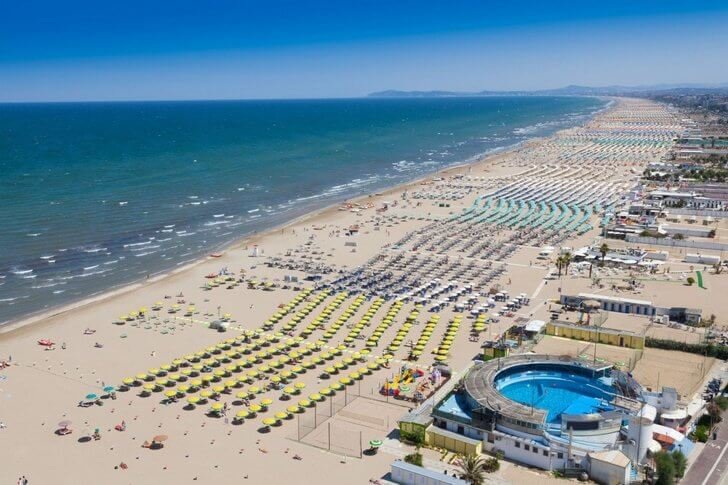Since the 19th century, the center of the Emilia-Romagna region, the city of Rimini, has been known as a resort on the Adriatic coast, equally attractive for both Italians and tourists from other European countries. Its history dates back to pre-Roman times, although the official date of foundation is 268 BC.
In the Emilia-Romagna region, many famous people were born who glorified Italy throughout the world - tenor Luciano Pavarotti, director Federico Fellini, designer Alberta Feretti and the incomparable composer Giuseppe Verdi. In Rimini, the historical heritage of different eras has been preserved. Today, tourists can admire the Roman arch of Emperor Augustus, the Palazzo Cavour Square and the works of art of the city museum.
And yet, Rimini is, first of all, a magnificent sea, well-maintained beaches and an unforgettable vacation on the Adriatic coast. The local tourist infrastructure began to develop decades ago, so the quality of service has long been kept at a high level.
What to see and where to go in Rimini?
The most interesting and beautiful places for walking. Photos and a short description.
Borgo San Giuliano
For many centuries, Borgo San Giuliano was just a dysfunctional suburb of Rimini. Since this area has become one of the favorite places of director Federico Fellini, its streets and squares have changed markedly. After the death of the great master of Italian cinema, the houses were painted with colorful frescoes, the balconies were decorated with flowers, and many buildings were restored. Borgo San Giuliano has developed into a fashionable area with an appropriate atmosphere and real estate prices.

Cavour Square
One of the central squares of Rimini, the recognized cultural center of the city. Around the square are the main architectural attractions - medieval palazzo and the city theater. On the piazza itself, there is a fountain made of white marble of the 16th century and a monument to Pope Paul V dating back to the 17th century. Near the square there is a market where fish and seafood have been sold for over two hundred years.
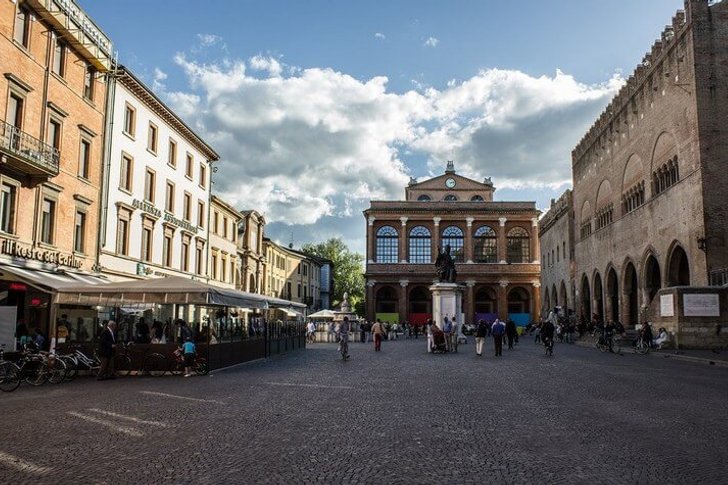
Tre Martiri Square
The square arose at the intersection of three Roman roads in the 2nd century BC. In those distant times, Rimini was called Ariminum. The modern name "Tre Martini" (which means "three martyrs") was given to the place in 1944 in honor of three Italian partisans who opposed the Nazi regime of Mussolini and were hanged here in front of the inhabitants of the city. There are several architectural monuments of the 16th century on Tre Martini.
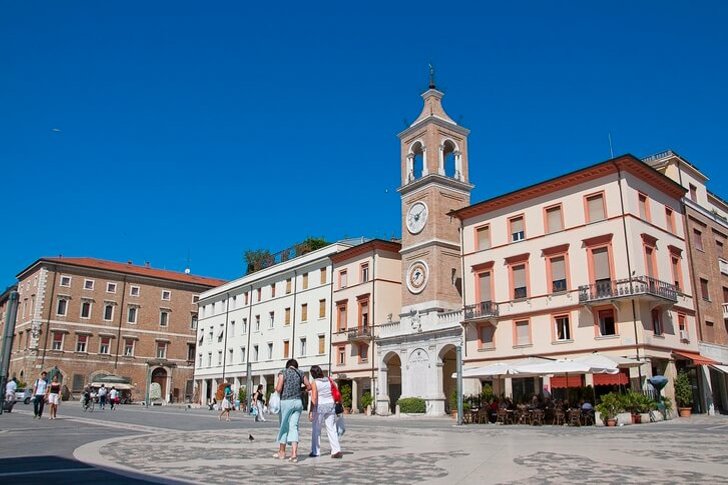
Arch of Emperor Augustus
The building is the oldest Roman arch in Italy. It was erected in the 1st century BC. In the Middle Ages, the arch served as part of the city gates, which reliably guarded the approaches to Rimini from the south, and was built into a powerful fortress wall. In the upper part of the building, a Latin inscription has been preserved, informing that the Senate and the Roman people dedicate this arch to Emperor Octavian Augustus.
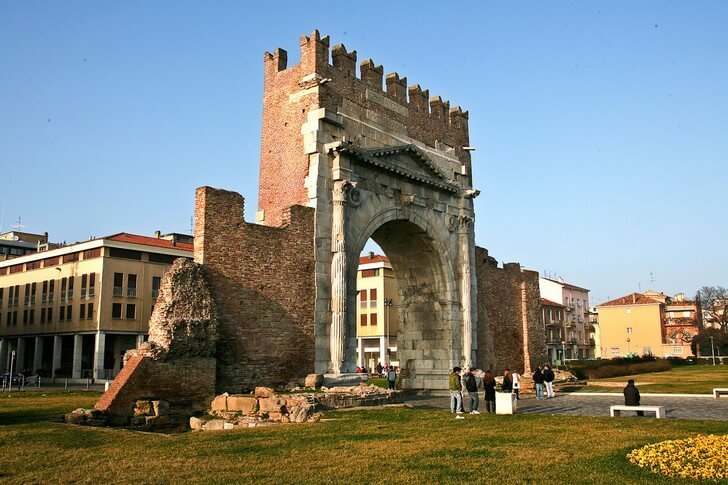
Tiberius Bridge
The bridge was built in the 1st century. In the 6th century, it suffered significant damage during the invasion of the Goths and was restored only in 1680. The bridge is open to both pedestrians and vehicles. Among the inhabitants of the city, the unofficial name "Devil's Bridge" is widespread, since according to local legend, the construction survived two millennia solely thanks to the help of Satan.
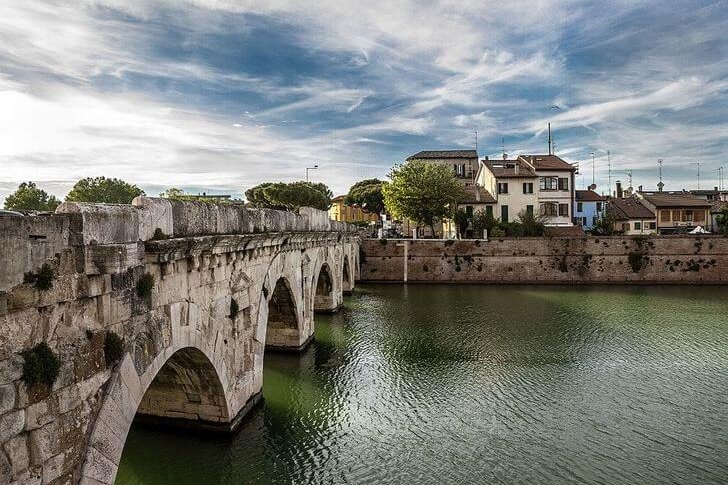
Sismondo Castle
A powerful fortress of the XV century, erected under the ruler of Rimini Sigismondo (Sismondo) Pandolf Malatesta. The castle served as his residence and at the same time defended against popular uprisings. In the 19th century, the building was turned into barracks for the accommodation of the Carabinieri. A few years later, the outer walls of the fortress were demolished. Nowadays, the premises of the castle are used for various cultural events.
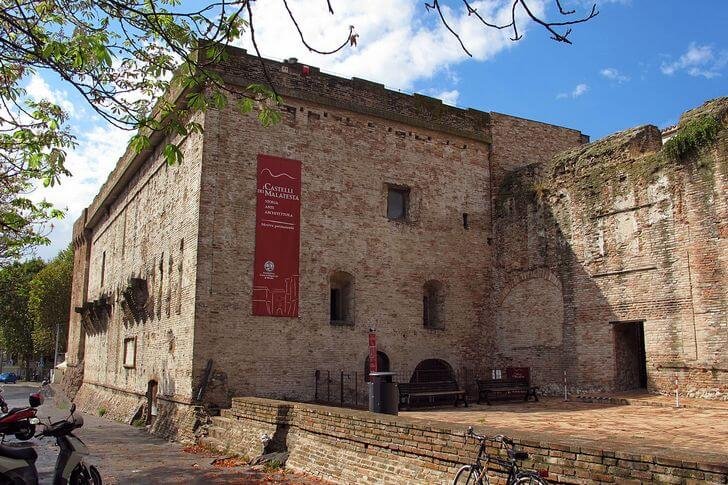
Tempio Malatestiano
The Cathedral of Rimini, built in the 15th century according to the project of L. Alberti, a scientist, architect and humanist of the Renaissance. The very first church on the site of the temple was built in the 9th century. In the 13th century, it was replaced by the Gothic church of the Franciscan Order, which was reconstructed by order of the ruler Sigismondo Pandolfe. At the beginning of the 19th century, French troops destroyed the nearby Franciscan monastery, the temple itself was consecrated again as a city cathedral.
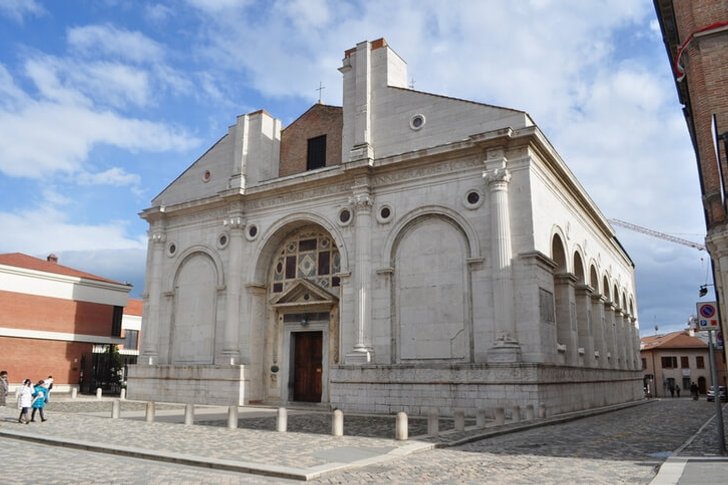
"Surgeon's House"
Archaeological complex consisting of several cultural layers, the earliest of which is more than two thousand years old. In the II-I centuries BC, there was a two-story residential building that existed until the fire of the III century. Also on the territory of the ancient Roman ruins, later buildings dating back to the Early Middle Ages and the 16th-18th centuries were discovered. The Surgeon's House got its name from a set of surgical instruments found in its depths.
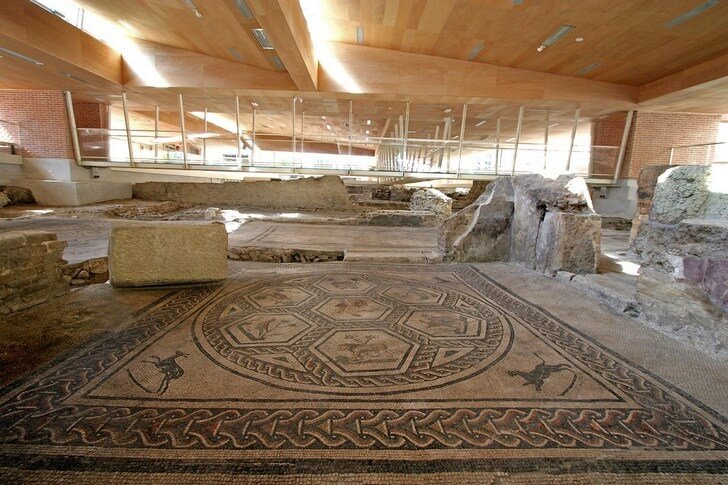
Civic Museum of Rimini
The museum's collection occupies the building of a former Jesuit monastery in the middle of the 18th century. It is housed in forty galleries, where several hundred artifacts related to the history of Rimini are kept, belonging to different time periods. The exposition is located on three floors. On the first one there are ancient artifacts, on the second and third there are paintings, frescoes, sculptures, ceramics and other items created in the XIV-XIX centuries.
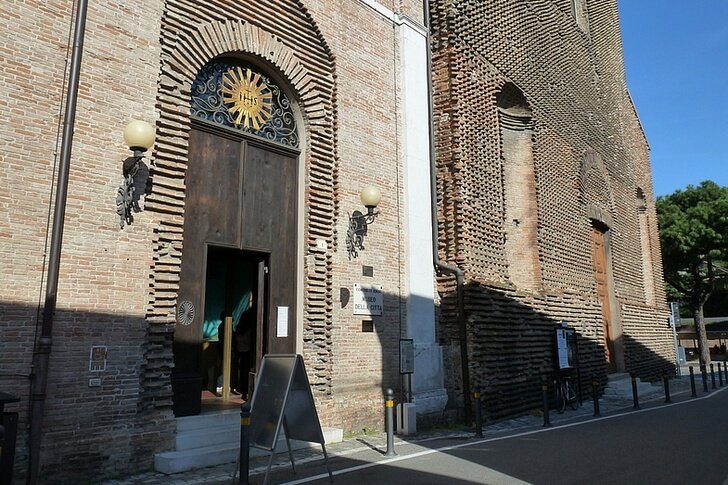
National Motorcycle Museum
The museum's collection consists of more than two hundred motorcycles of Italian and foreign brands. There are both the very first specimens that appeared at the dawn of the motor industry, as well as modern devices. Every month, the museum hosts a meeting-exhibition where fans of "iron horses" can put their motorcycles up for sale or exchange them with each other. The exposition was founded in 1993 by a group of enthusiasts.

Park "Italy in miniature"
The park was created in 1970 on the initiative of I. Rimbaldi, one of the city's businessmen. He was inspired by similar places that already existed in other countries and decided to create something similar in his homeland. In the miniature park of Rimini, tourists will be able to see all the iconic sights of Italy and some European countries. There is also an amusement park dedicated to the achievements of science.

Fiabilandia amusement park
Fiabilandia is located in the outskirts of Rimini and is one of the oldest theme parks in Italy (its opening took place in 1965). There are several dozen attractions, many playgrounds, restaurants and recreation areas. Visitors can swim on a pirate ship, swim in the "Dream Lake" or go on an exciting excursion to the "Merlin the Magician's Castle".
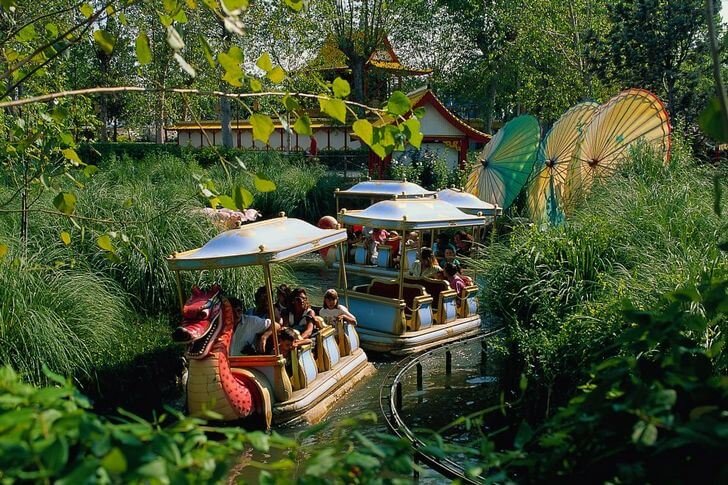
Federico Fellini Park
The famous F. Fellini is a native of Rimini. The city park near the embankment, named after him, is one of the favorite vacation spots for tourists. Festivals, sports competitions and children's parties are held here. The park is decorated with the sculptural group "Fountain of the Four Horses", created in 1928 by master F. Fabbri. During World War II the fountain was destroyed. Restoration took place only in 1983.
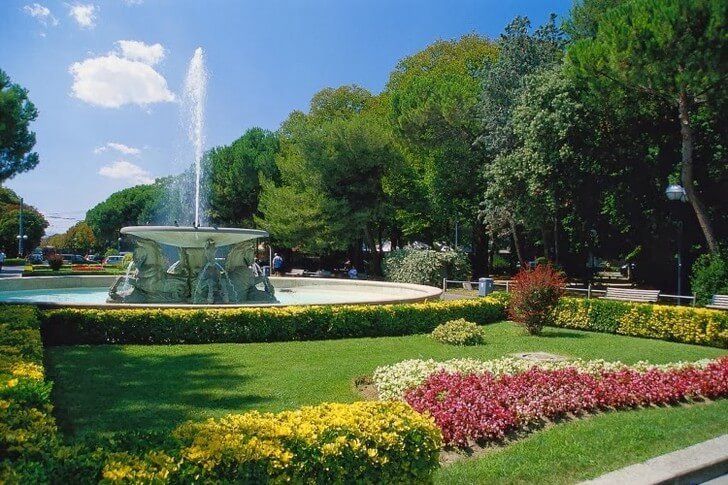
Rimini ferris wheel
The Ferris wheel is located in the port area. From its highest point (60 meters) in clear weather, you can see San Marino. While riding the wheel, the passenger has a picturesque view of the streets of Rimini, the Adriatic coast and the green hills of the Emilia-Romagna region. One ticket is allowed to make three full circles. This time is just enough to enjoy the beauty of the landscapes.
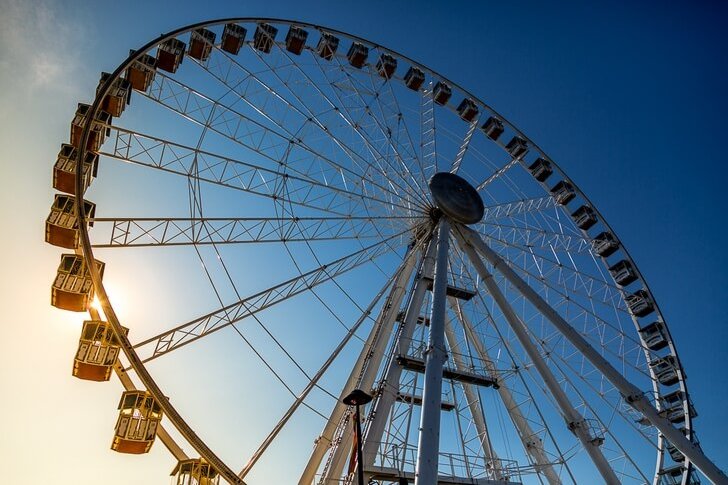
The beaches of Rimini
Rimini is a famous resort of the Adriatic, which is very popular among European tourists. The coastline with beaches stretches for 15 km, it is divided into several zones, each of which consists of dozens of beaches. All of them are numbered from 1 to 150. Each beach has sun loungers and umbrellas of its own colors, so in season the Rimini coast looks very festive and elegant.
